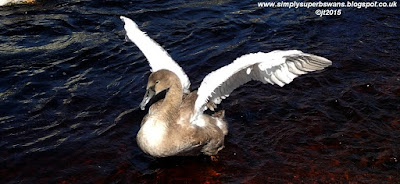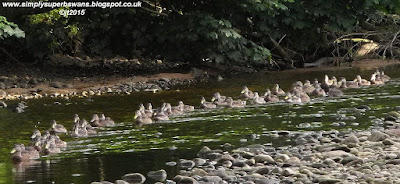Monday, 31 August 2015
Last Of The Seasons Ducklings ?
Was told about a duck with 11 ducklings last week coming out of the Cemetery burn, she has now turned up near Merryton with only 2 left.
It seems the Crows are as bad up by the Jubilee bridge as they are down here.
If you happen to see the ducklings please don't throw bread at them,
we have dozens of gulls near the Merryton bridge and the ducklings are too small to eat bread anyway.
Perhaps this is the last of the seasons ducklings.
Sunday, 23 August 2015
Spot The Difference
People often ask how to tell the difference between Popeye and Penny our resident Cob and Pen. Yesterday I had the chance to get a close - up of both of them together at the right angle.
Popeye is on the left , and you will notice the black fleshy lump at the base of his bill is much larger than on Penny who is on the right. Popeye is also heavier and his orange bill is usually a deeper shade than Penny most of the year.
Friday, 21 August 2015
Glebe Road Ducklings Released
After 7 weeks the Glebe road rescued ducklings were finally released.
Hopefully they will avoid being taken by the Great black back gull.
They seem to have no problem integrating with all the other ducks on the river and enjoy their new found abundance of fresh water.
Meanwhile the cygnets are head nodding and starting to see who's who.
Thursday, 20 August 2015
Young Birds
The past week I have seen several casualties of young herring gulls.
Not everyone's favourite bird, but I don't like to see them getting run over, sometimes deliberately so. The other day I had to fish one out of the river for the SPCA, and a few days before that picked one off the street with a shattered wing. I have also seen several flattened on my street which is narrow and one way - so no excuse to be run over.
There are other species which are a lot luckier, like a young Sparrowhawk I saw the other day sitting under my feeder tree!
Labels:
herring gull,
Scottish SPCA,
sparrowhawk,
young birds
Monday, 17 August 2015
Cygnets Practice
Penny has finished moulting and grown her new flight feathers. Today it was time to toughen up the new feathers and stimulate the Cygnets to do the same.
This is the final fledging process, prior to flight training in September. Short video below.
Saturday, 15 August 2015
Nairn Games and VJ Day
For all our viewers something a little different. Today happens to be Nairn Highland Games day, and by coincidence also VJ day.
The skies have brightened up after a dull start and the pipes and drums get the pulses going. Short video of the opening march below.
Thursday, 13 August 2015
Getting The Low Down
Took some low down shots of some of my regular pals on the river today.
Bluey the rock dove is the most friendly of the pigeons, and has charmed quite a few people over the past year.
The cygnets too are incredibly well behaved and orderly.
Saturday, 8 August 2015
Super Glued Cygnet
Someone asked me today if the little cygnet that was attacked by a crow had survived ? I can report that "Gluey" is alive and well, and that his super glued head wound has healed but left him with a slight dent in the head.
It was back in May a few days after it was hatched, when Gluey was attacked then taken to the Vet where his open head wound was cleaned and super glued together.
Now 3 months later he is a fine healthy young swan, happy to pose showing his beautiful but slightly dented head !
Friday, 7 August 2015
Line Out
Seems like the ducks like to travel in single file when they are moulting.
Swans do it out of habit and family security.
Tuesday, 4 August 2015
Angel Wing Cygnet
Yesterday I received an email for advice on a cygnet with Angel wing. Clare Kendall on the Kennet and Avon canal was concerned about a family of Swans that she has observed since hatching, and found my Blog post on Angel wing while doing an internet search.
Clare emailed the enclosed photo's showing the cygnet with both wings badly affected. Angel wing is a condition that might genetically appear every few generations, or as a result of poor diet and too much protein. Clare says that tourists are forever feeding them white bread and other rubbish and thinks this might be the cause. Angel wing starts by rapid growth of the wings, when the bone structure is not yet strong enough to support the weight of the new feather growth which is heavy with blood . The wing feathers then start to fall outwards and end up growing out from the body rather than correctly folded onto the back.
This has a devastating effect because the bird will never be able to fly and is banished from the family unit, and sometimes killed by the parents when they try to drive it away when fledged. The condition is easily corrected by bandaging the wing into the correct position for a week or so, and giving it a green diet, but has to be done early enough to succeed. This case is quite advanced and might not be fixable. I have passed information onto Clare, and Sue our Avian adviser who might be able to help.
BELOW: I successfully treated "Lefty" one of our cygnets a few years back at an earlier stage,
it was the only cygnet case of potential Angel wing I have known in the last 11 years on our river.
Labels:
angel wing cygnet,
Clare Kendall,
Kennet and Avon canal,
Lefty
Subscribe to:
Comments (Atom)






































